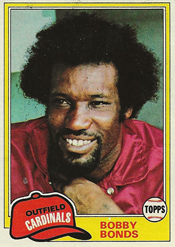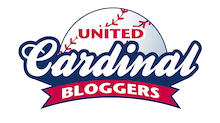Bobby Bonds, expected to bring power and balance to the lineup, symbolized the dysfunction of the 1980 Cardinals.
 On Dec. 7, 1979, the Cardinals acquired Bonds from the Indians for pitcher John Denny and outfielder Jerry Mumphrey.
On Dec. 7, 1979, the Cardinals acquired Bonds from the Indians for pitcher John Denny and outfielder Jerry Mumphrey.
An outfielder, Bonds figured to join George Hendrick to give the Cardinals two right-handed sluggers to balance a lineup with switch-hitters Ted Simmons and Garry Templeton and batting champion Keith Hernandez, who hit left-handed.
Bonds, who had 25 home runs and 34 stolen bases for the 1979 Indians, was projected to play left field and replace Lou Brock, who retired.
The deal turned out to be a dud. Bonds, 34, injured his right wrist early in the season and couldn’t hit for average or power. The 1980 Cardinals, who fired their manager and general manager during the season, finished 74-88.
All in the family
Bobby Lee Bonds was born in Riverside, Calif. An older brother, Robert Vernon Bonds Jr., a receiver and defensive back at San Jose State, got selected by the St. Louis football Cardinals in the fifth round of the 1965 NFL draft and played in Canada. A sister, Rosie, was a hurdler for the U.S. in the 1964 Olympics.
Bonds excelled in baseball, football and track in high school and became a state long jump champion. He married at 17 and became a father at 18 when his son, future home run champion Barry Bonds, was born in July 1964. A month later, with a wife and child to support, Bonds signed an $8,000 contract with the Giants.
The Giants sent Bonds to their farm club in Lexington, N.C., in 1965. Disheartened by the racism he encountered, Bonds wanted to quit, but Lexington manager Max Lanier, the former Cardinals pitcher, became his trusted mentor and advisor. Bonds stayed and began his rise through the Giants’ system.
On June 25, 1968, Bonds made his major-league debut against the Dodgers at Candlestick Park and hit a grand slam. Boxscore He formed a friendship with the Giants’ shortstop, Hal Lanier, Max’s son.
Mixed reviews
Bonds and Willie Mays were the first players to achieve 300 home runs and 300 stolen bases in their careers. Bonds won three Gold Glove awards and three times was an all-star.
He also struck out a lot and drank a lot. Bonds twice was arrested for drunk driving and had another arrest for an altercation with a police officer. Bob Broeg of the St. Louis Post-Dispatch wrote, “When the poor guy did drink too much, as one sympathetic soul put it, he must have gone looking for a policeman.” After his playing days, Bonds joined Alcoholics Anonymous, according to the Society for American Baseball Research.
Bonds played for six teams (Giants, Yankees, Angels, White Sox, Rangers and Indians) in six years (1974-79). In July 1979, he told the Indians he wanted to be traded unless they increased his yearly salary from $440,000 to $672,000. Indians fans responded with a barrage of boos. In September 1979, Bonds made an obscene gesture to a fan and was fined.
Asked about Bonds’ controversies after acquiring him, Cardinals general manager John Claiborne told The Sporting News, “I don’t know about his history and I don’t care. He has produced and that’s all I’m concerned about.”
Cardinals manager Ken Boyer said Bonds will “make a big difference in our offense” and “with Bonds’ arm, you’re going to see things defensively you haven’t seen in a while.”
Indians outfielder Rick Manning viewed Bonds differently, saying, “Bobby wouldn’t hit the cutoff man if he were King Kong.”
Bonds predicted, “If I just do what’s average, it should be enough to win the pennant and get in the World Series.” He also cautioned, “If it doesn’t go the way they expect it to go with the Cardinals, I’ll be the first one gone.”
A season unravels
Bonds preferred uniform No. 25, but in St. Louis it belonged to Hendrick, so Bonds became the first Cardinal to wear No. 00.
Boyer began the 1980 season with Bonds batting fifth in the order between Simmons and Hendrick.
On April 17, 1980, in Bonds’ seventh game with the Cardinals, he was hit on the right wrist by a pitch from the Pirates’ Eddie Solomon. Boxscore
Bonds continued to play, but the damaged wrist hampered his swing and he was committing too soon on breaking balls. On May 18, 1980, after striking out three times in a game against the Giants, Bonds asked Boyer to send someone to bat for him when his turn came again in the ninth. Boxscore
“Bonds swung a bat that resembled a fly swatter,” wrote Post-Dispatch columnist Tom Barnidge.
With the Cardinals’ record at 18-33, Boyer was fired in June 1980 and replaced by Whitey Herzog, who benched Bonds against right-handed pitching.
Bonds said he was experiencing “the most frustrating season of my life. I want to contribute and I haven’t been. I have no criticism of Whitey.”
On July 21, 1980, Bonds went on the 15-day disabled list. When he returned, he cut a finger on his right hand trying to get an item off a room service tray.
Claiborne was fired in August 1980 and one reason cited was the trade for Bonds.
Bonds hit no home runs after July 13 and had no hits after Aug. 18. He finished his Cardinals season with a .203 batting average, five home runs and 15 stolen bases. He batted .145 against right-handers.
On Dec. 22, 1980, after failing to trade Bonds, the Cardinals released him.
He played for the Cubs in 1981, his final big-league season, and twice in a span of three days, Sept. 7 Boxscore and Sept. 9 Boxscore, hit two home runs in a game against the Cardinals at St. Louis.

I remember a game in Philly with Steve Carlton pitching. He struck out Bobby four times. Carlton kept throwing his hard slider down and in and Bonds kept swinging over the top of it. I don’t think he even fouled off a pitch. I began to feel sorry for him because he was so over matched. A number of the players on the team had good offensive numbers that year but Bobby wasn’t one of them.
Good story. Thanks for sharing.
When I was a kid, I attended a private catholic school. Most of the teachers were nuns and priests. One of the few exceptions was the PE teacher. Not only was he originally from the Bay area, but he also played some minor league ball with the Twins and Cubs before a knee injury ended his career. Just like the other teachers, he would always warn us about drugs, alcohol, etc. The one difference being that he would often use his boyhood idol and favorite baseball player as an example. At the time he never told us exactly who this player was, but, he would always say that even though he was a good player, he had a chance to be one of the greatest. He would go on to tell us don’t waste your gifts and talents like he did. A few years later, being a bit older and a little more knowledgeable about baseball, I realized he was referring to Bobby Bonds. One of the few good days that Bonds had with us was on July 17 1980. The Cards beat the Padres that day 15-3. We scored 10 runs in the 3rd inning. Bobby led off the 3rd with a single. As Padres pitcher Rick Wise was pitching to Gary Templeton, he had Bonds picked off 1st. His throw however went wild and Bobby ended up on third and scored the first of ten runs. In the same inning, he would hit another single and score a second run.
Another good story. Thanks for sharing.
Those wrist injuries take a long time to heal. Roger Maris’ home run power all but disappeared, and Andres Galarraga’s second-half recovery occurred too late for the Cards to hold on to him. When St. Louis got him, I was thinking of an Orlando Cepeda or Dick Allen-type year. In addition to the wrist, and off-field problems, his knees were problematic by then, also.
Good points and good examples. Thanks.
I should have proofread my comment. The “him” to whom I was referring, of course, was Bonds.
A basic fact wrong here. Bobby Bonds didn’t play high school baseball at all. As a senior, he played on weekends for a club team in the San Fernando Valley (150 mile round trip) managed by the Giants’ SoCal area scout, George Genoese, who recruited him simply because he could run. He tells the story in his self-published book, available on Amazon. Lots of interesting stories in there, e.g., how the Giants blew chances to get Tom Seaver and Eddie Murray.
According to multiple sources, including the Society for American Baseball Research, Bobby Lee Bonds played baseball for Riverside Polytechnic High School.